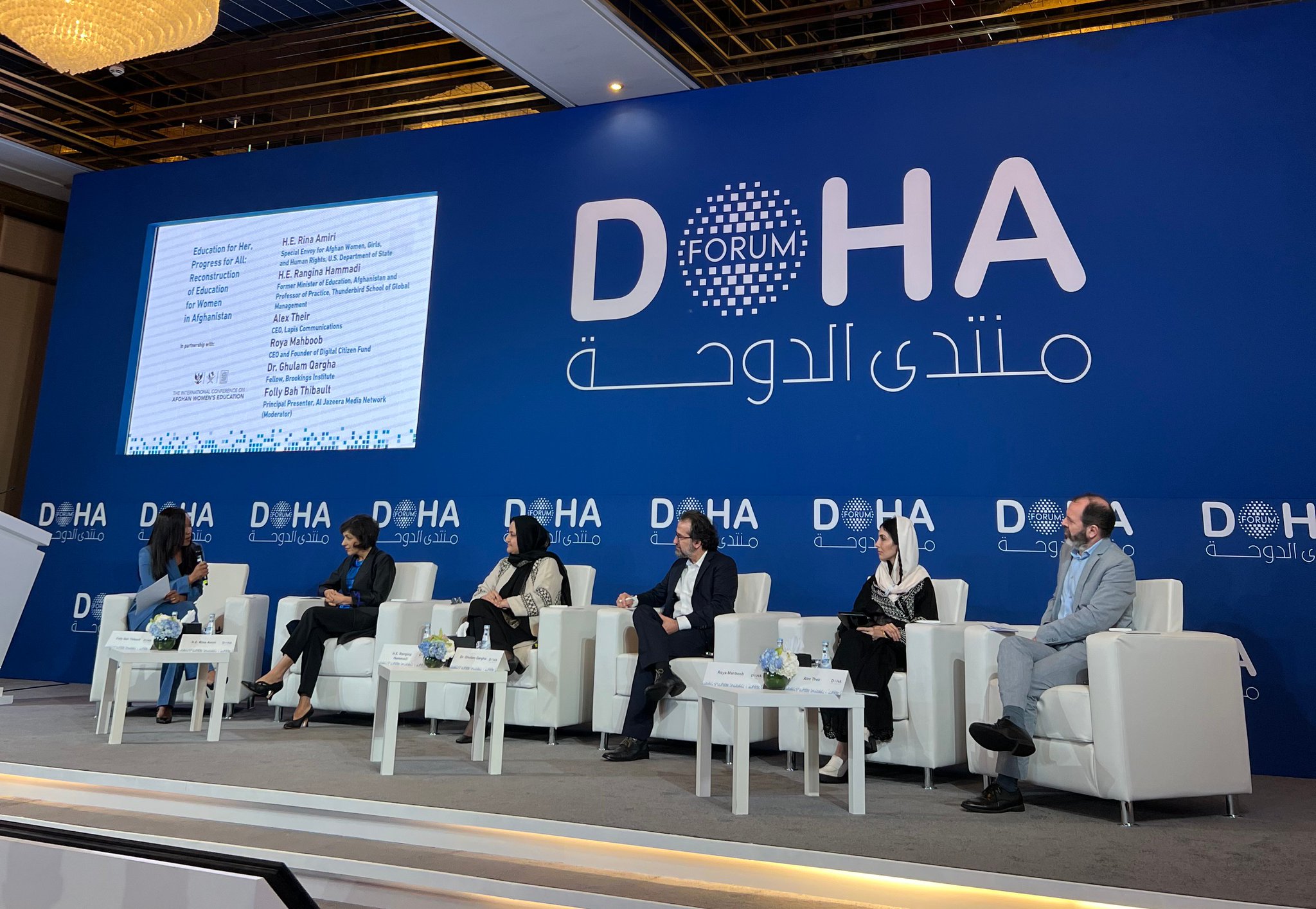World leaders and key thinkers collaboratively grapple with overcoming modern conflict – a hindrance to development.
The 21st edition of Doha Forum kicked off on Sunday, with four panel sessions dedicated to discussing the critical needs of women amid rising authoritarianism and modern war.
Doha News attended the ‘Education for Her, Progress for All: Reconstruction of Education for Women in Afghanistan’ session, which unpacked the impact of the Taliban regime’s 2022 ban on Afghan women and girls attending secondary and university institutions.
According to UNICEF, 3.7 million Afghan children are not in education, with 60% of them being girls.
This session was paneled by America’s Special Envoy for Afghan Women, Girls and Human Rights Rina Amiri.
Afghanistan’s former Minister of Education, Rangina Hamidi was also in attendance, alongside Afghan businesswoman, CEO and Founder of Digital Citizen Roya Mahboob.
CEO of Laps Communications, Alex Thier and Brookings Institute Fellow Ghulam Omar Qargha weighed in on the conversation, too.
Qargha, whose areas of interest include curriculum development and educational delivery in the Global South, said during the session that he has worked in Afghanistan’s educational space for the past 20 years, and much like other Global South nations, Afghanistan’s educational sector is failing.
“We have an idealised image of what our educational system was, but we have to be realistic, our educational system was failing,” Dr Qargha said during the talk. In light of this, Dr Qargha emphasised the need for a localised educational system.
Speaking to Doha News about whether a localised education would cut off Afghan youth from the wider world, Dr Qargha said that it is important to have a system that responds to one’s locale first.
“Some of the Taliban’s complaints about education might be that it hasn’t been localised, and I think that part of it, we have to acknowledge. But that doesn’t mean cutting off from the global environment,” he added.
When asked what a localised Afghan education would look like, Dr Qargha talked about the example of a private school called Mezan. “This means ‘balance’,” he said. “It was based on Islamic foundations, Afghan culture and a STEM-focused curriculum. The school combined what is good from the global, without forgetting our Afghan roots.”
For Roya Mahboob, localising Afghan education should also be inclusive of Afghan languages. She told Doha News that, “most of the content is in English, so we need to translate it into the languages of Dari and Pashto because most Afghans cannot speak English.”
In terms of the Islamic view on women’s STEM education, she added that “with Islam, I think we might not have that much issue.”
“Girls will learn how to work with a computer. They learn about coding, they learn about robotics, they learn a little about engineering. And all of this [will] help them learn how to be a more critical thinker, how to solve problems in the society,” she said.
Senegalese women’s economic empowerment
Another session centred on the critical needs of women yesterday was the ‘Inclusive Economic Systems for Sustainable Growth’ talk. This talk explored how financial institutions, development agencies and governments can work together to support women of the Global South in unlocking their economic potential.
The panel included Senegal’s President Macky Sall, the United Nations Development Programme Administrator Achim Steiner and Safaricom’s Head of FinTech, Juliana Rotich.
“When we talk about inclusion, when we have a goal to develop our country, we have to take care of two targets. One is women, and the second is children,” said President Sall.
President Sall discussed his initiative of creating a banking system, especially for women and Senegalese youth. This initiative enables women and youth to take loans at very low rates. This, according to President Sall, was to include women in the Senegalese economy.
According to a UN Women report, Senegal’s Ministry of Women, Family and Gender, in cooperation with the Presidency, monitors the progress of such initiatives “to produce and collect indicators and gender variables at the administrative level and at the National Statistical System level.”
The other two sessions of the day which focussed on women’s needs were the ‘Afghan Women as a Source of Afghan Stability’ and ‘Exploring Innovative Solutions to Address Critical Health Needs for Women in Conflict Settings’ talks.







